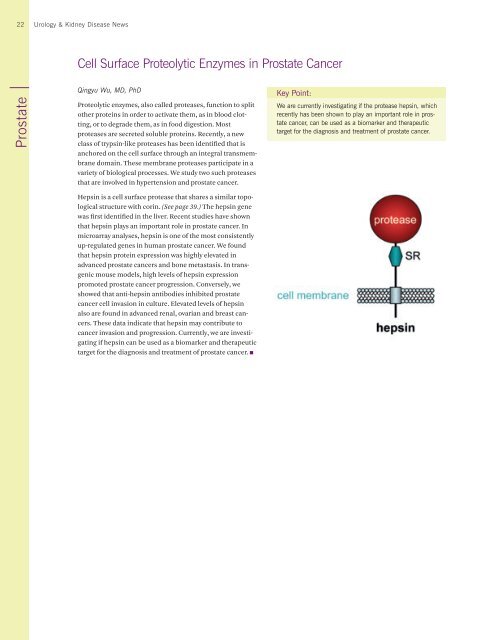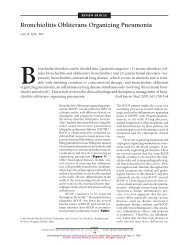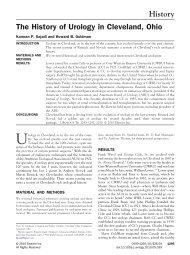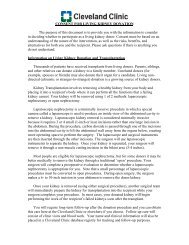Urology & Kidney Disease News - Cleveland Clinic
Urology & Kidney Disease News - Cleveland Clinic
Urology & Kidney Disease News - Cleveland Clinic
Create successful ePaper yourself
Turn your PDF publications into a flip-book with our unique Google optimized e-Paper software.
22 <strong>Urology</strong> & <strong>Kidney</strong> <strong>Disease</strong> <strong>News</strong><br />
Prostate<br />
Cell Surface Proteolytic Enzymes in Prostate Cancer<br />
Qingyu Wu, MD, PhD<br />
Proteolytic enzymes, also called proteases, function to split<br />
other proteins in order to activate them, as in blood clotting,<br />
or to degrade them, as in food digestion. Most<br />
proteases are secreted soluble proteins. Recently, a new<br />
class of trypsin-like proteases has been identified that is<br />
anchored on the cell surface through an integral transmembrane<br />
domain. These membrane proteases participate in a<br />
variety of biological processes. We study two such proteases<br />
that are involved in hypertension and prostate cancer.<br />
Hepsin is a cell surface protease that shares a similar topological<br />
structure with corin. (See page 39.) The hepsin gene<br />
was first identified in the liver. Recent studies have shown<br />
that hepsin plays an important role in prostate cancer. In<br />
microarray analyses, hepsin is one of the most consistently<br />
up-regulated genes in human prostate cancer. We found<br />
that hepsin protein expression was highly elevated in<br />
advanced prostate cancers and bone metastasis. In transgenic<br />
mouse models, high levels of hepsin expression<br />
promoted prostate cancer progression. Conversely, we<br />
showed that anti-hepsin antibodies inhibited prostate<br />
cancer cell invasion in culture. Elevated levels of hepsin<br />
also are found in advanced renal, ovarian and breast cancers.<br />
These data indicate that hepsin may contribute to<br />
cancer invasion and progression. Currently, we are investigating<br />
if hepsin can be used as a biomarker and therapeutic<br />
target for the diagnosis and treatment of prostate cancer.<br />
Key Point:<br />
We are currently investigating if the protease hepsin, which<br />
recently has been shown to play an important role in prostate<br />
cancer, can be used as a biomarker and therapeutic<br />
target for the diagnosis and treatment of prostate cancer.

















